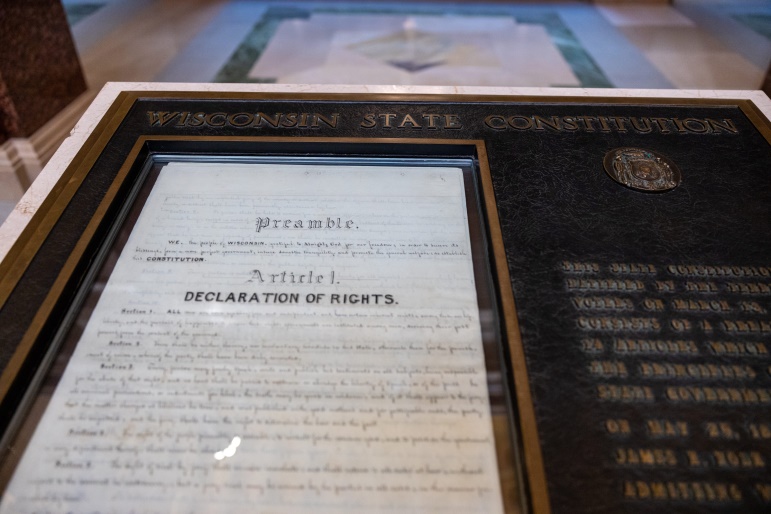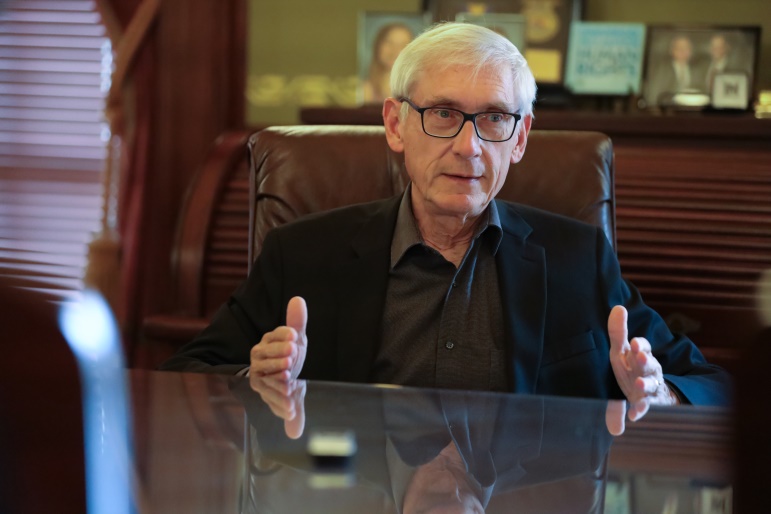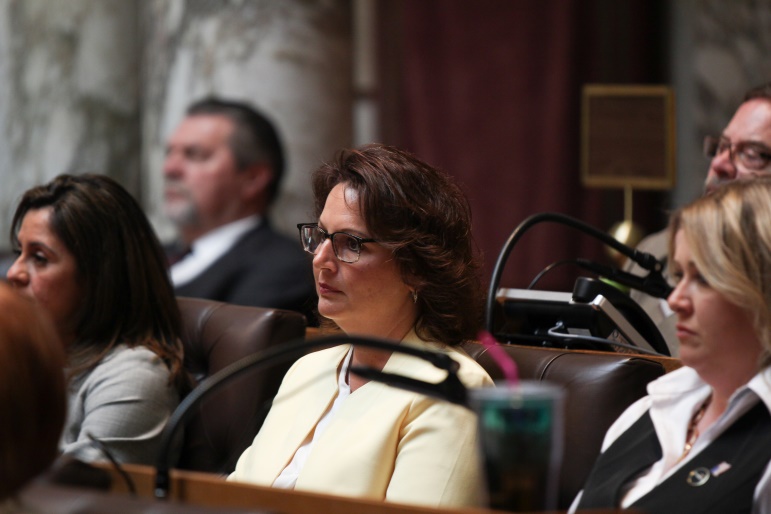State Republicans Now Pushing Agenda Through Constitutional Amendments
The GOP seeks to lock in policy wins by bypassing courts, governor.

The Wisconsin Constitution, shown on display in the Capitol rotunda in Madison, has been amended nearly 150 times since the state’s founding in 1848. Republicans want to enshrine additional conservative policies in the founding document. (Coburn Dukehart / Wisconsin Watch)
This story was originally published by Wisconsin Watch.
Facing political opposition in both the governor’s office and Wisconsin Supreme Court, legislative Republicans are seeking to lock in existing conservative policies — and in some instances, create new ones — with the direct help of voters.
Lawmakers are considering this legislative session almost as many amendments as have been passed over the last 20 years.
To amend the constitution, lawmakers must approve identical changes in consecutive two-year legislative sessions. Constitutional amendments do not require the governor’s approval. From there, Wisconsin voters must approve the change via a majority vote on a referendum.
Among the proposed changes receiving first or second consideration from lawmakers this session are proposals that would require a two-thirds supermajority in the Legislature to enact tax increases; prevent municipalities from using private grants to cover election-related costs; and give the Legislature, not the governor, decision-making power over how the state spends certain federal funds.
Some Republican-aligned policy advocates want lawmakers to go further by writing pillars of the state’s modern conservative movement into the state constitution.
That would include a statute, known as right-to-work, which prevents any requirement that all employees at a unionized business join the union, and the framework for the state’s private school voucher programs.
They contend the amendments are the most democratic way to settle debates about these issues, by allowing Wisconsinites to have a direct vote on them.
“At the end of the day, this avenue of constitutional amendments is wholly legitimate, pro-democracy, and it gives Wisconsinites a chance to vote up or down on these important questions,” said Anthony LoCoco, chief legal counsel at the Institute for Reforming Government, a conservative think tank.
A lawsuit challenging the wording of one recent constitutional amendment posed to voters in April 2020 worked its way to the state Supreme Court, where the justices overturned a lower court ruling that found the question didn’t adequately inform voters about the ramifications of the change. That amendment, known as Marsy’s Law, expanded the rights of crime victims and was overwhelmingly approved by voters, but has since raised questions about due process for criminal defendants and accountability for police conduct.
Democrats have cried foul on the amendments, likening them to the lame-duck legislation that stripped the governor and attorney general of certain powers after Democrats won in 2018 but before they took office.
“(The amendments are) just a way to retain power and they’re going to do that as long as they are in power,” Gov. Tony Evers said in an interview with Wisconsin Watch. “And I think it’s been amplified even more recently because there might be an end of the road on this power thing pretty soon.”
Several amendments in the works
During the 2021-22 legislative session, Republican lawmakers introduced nine constitutional amendments for first consideration, passing four of them through both chambers of the Legislature.
Two of them have been approved already this session and ratified: a pair of amendments that made changes to Wisconsin’s cash bail system, including allowing judges to consider past convictions for violent crimes when setting bail for someone accused of a violent crime.
For someone accused of a crime, the proposals also allowed a judge to set conditions for pretrial release that protect the public from “serious harm.” Both amendments were approved by Wisconsin voters in April, but they are being challenged in Dane County Circuit Court by EXPO Wisconsin, an organization that advocates for formerly incarcerated people.
Among the amendments still available for second consideration this session are:
- A proposal that would prevent local governments from accepting grant money or other private resources to help administer elections. The amendment would also bar “any individual other than an election official designated by law from performing any task in election administration,” according to a Legislative Reference Bureau analysis of the bill. The amendment arises from Republican anger about private grants that were distributed to both large and small municipalities across the state ahead of the 2020 election. Sen. Eric Wimberger, R-Green Bay, the amendment’s chief sponsor in the Senate, said at a public hearing Oct. 24 that an Evers veto of similar legislation in June 2021 prompted the amendment.
- An amendment that would give the Legislature, not the governor, say over how certain federal funds are spent by the state. This amendment stems from legislation vetoed by Evers in April 2021. The Assembly approved the amendment this session but the Senate has yet to act.
- A proposal that declares only “qualified electors” can vote in “an election for national, state, or local office or at a statewide or local referendum” in Wisconsin. The Wisconsin Constitution defines “qualified elector” as a United States citizen age 18 or older who is a resident of an election district in the state. The amendment comes as some towns in other states — 11 in Maryland and two in Vermont — allow noncitizens to vote in certain local elections.

Democratic Gov. Tony Evers, photographed in the governor’s Capitol office in Madison, says the Republican proposals to amend the constitution are “all about power” and “wrong-headed.” He would prefer voters be able to initiate ballot measures. (Coburn Dukehart / Wisconsin Watch)
Republicans have released four constitutional amendments for first consideration in the 2023-24 legislative session, including:
- Requiring a two-thirds supermajority in both chambers of the Legislature to raise the state sales tax, corporate tax or income tax rates in Wisconsin. The amendment passed the Assembly in September and has been referred to a Senate committee.
- Barring the state or “a political subdivision” of the state from forbidding gatherings in places of worship in response to a state of emergency, including a public health emergency. The amendment has not yet been voted on by either chamber.
- Codifying an existing state statute that requires a voter to show an accepted form of photo ID before casting a ballot. The amendment passed the Assembly last session but not the Senate, so it’s up for first consideration again in the 2023-24 session.
- Requiring certain fees collected by communications providers to be deposited into designated funds that can only be spent on updates to existing 911 service infrastructure. The money currently goes to the state’s general fund. Neither the Assembly nor Senate has voted on the amendment.
9 of 10 amendments passed since 2000
Over the past two decades 10 amendments — including the bail amendments — have been posed to voters, with all passing except one: abolishment of the state treasurer office in 2018. Three have passed under Evers, two passed under previous Republican Gov. Scott Walker and four passed under Democratic Gov. Jim Doyle.
Those that passed included a 2003 amendment that guaranteed “the right to fish, hunt, trap, and take game subject only to reasonable restrictions,” which received 82% support from voters.
And several others have landed in court. A 2006 amendment — approved by 59% of voters — that declared “only a marriage between one man and one woman shall be valid or recognized as a marriage in this state” was deemed to violate the U.S. Constitution by a federal court in Wisconsin and a federal appeals court. In 2016, in a separate case, the U.S. Supreme Court legalized same-sex marriage, nullifying the Wisconsin constitutional amendment, though it remains in the document.
A lawsuit challenging a 2020 amendment that expanded the rights of crime victims, known as Marsy’s Law, worked its way to the Wisconsin Supreme Court. The complaint contended the question on the April 2020 ballot — which passed with 75% approval — didn’t adequately inform voters about the ramifications of the change. A Dane County judge ruled in favor of the challenge, but the state Supreme Court overturned that decision 6-1, finding the question was properly worded and therefore legally ratified.
The amendments approved by two-thirds of voters in April are also being challenged in court. A Wisconsin organization that advocates on behalf of formerly incarcerated people filed a lawsuit arguing the amendments were not submitted on time to the proper elections officials.
Dane County Circuit Court Judge Rhonda Lanford ruled Oct. 16 the case could move forward. The next hearing is scheduled for March 19.
Amendments protect key rights, Republicans say
GOP lawmakers have offered several reasons why the current legislative session is the right moment to amend the constitution, saying the changes protect Wisconsinites’ fundamental rights, like the right to vote.
Others, such as making it harder to raise taxes, are billed as a way to make Wisconsin a more attractive place to live.
“We want to make sure that each taxpayer sees that we are being conscious of the fact that we’re not just here to take their money and spend it for them, but rather it would be a last resort option,” said Rep. Amy Binsfeld, R-Sheboygan, who introduced the amendment at an August press conference at the Capitol.
“We also feel that it should be a two-thirds majority in which both parties should have a say, we need to work together,” Binsfeld added. “We need to use our ideologies together and do what’s best for Wisconsin — not just do it by a simple majority.”
Binsfeld, who declined an interview request, introduced the amendment just weeks after a lawsuit challenging Wisconsin’s gerrymandered legislative districts — which heavily favor Republicans — was filed with the liberal-controlled state Supreme Court. The court recently voted 4-3, along ideological lines, to hear the case and could put in place new district lines that threaten GOP legislative control.

Rep. Amy Binsfeld, R-Sheboygan, introduced a constitutional amendment to require a two-thirds vote of the Legislature to approve sales and income tax increases. She said voters should decide on whether to raise taxes, not a simple majority of the Legislature. (Drake White-Bergey / Wisconsin Watch)
Sen. Van Wanggaard, R-Racine, chief sponsor of the voter ID amendment, warned during an Oct. 24 public hearing that the now-liberal-controlled Wisconsin Supreme Court could throw out the state’s voter ID laws.
“I cannot say for certain how the Wisconsin Supreme Court would rule on voter ID laws, but I’m also not willing to risk the Wisconsin Supreme Court declaring voter ID laws unconstitutional,” Wanggaard said at the hearing. “The only way to ensure it will not happen is to enshrine this basic election integrity law in Wisconsin’s constitution.”
Wanggaard was also a lead sponsor of the Marsy’s Law and bail system amendments.
“When we look at voting, voting is probably the most important right we have because with that we can effect change,” Wanggaard said in an interview with Wisconsin Watch.
‘It’s all about power’
Democratic leaders told Wisconsin Watch the amendments represent acts of self-preservation from Republicans, whose decade-plus grip on the Legislature could come to an end if new, less skewed legislative maps are implemented.
“Legislative Republicans certainly see the writing on the wall and are doing what they can to try and enshrine their political agenda in the constitution,” said Assembly Minority Leader Greta Neubauer, D-Racine. “I believe, when we’re amending our state’s most important document, we should have a high bar of scrutiny. And a number of the amendments that Republicans have put forward I don’t think fit that bill.”
“Whether it’s (constitutional amendments), whether it’s impeaching people, whether it’s not approving my appointees, this is just one more thing,” Evers said in an interview at his Capitol office, listing a series of contentious confrontations he’s had with Republicans.
The governor also said his travel across the state has revealed that amending the constitution is not top of mind for voters.
“I spend 90% of my time going across the state. I’ve been to 72 counties every year I’ve been governor,” Evers said. “And for, I’d say, every single one of them, I’ve never heard any person in Bayfield County come up to me and say, ‘Oh, my God, we have to have a constitutional amendment on X’ — especially when X is already in state law.”
“It’s all about power,” Evers said of the amendments. “And I think it’s wrongheaded.”
It ‘should be the will of the people’
GOP lawmakers insist amendments allow Wisconsin voters to serve as a firewall and reject amendments they don’t like.
Since the state’s founding in 1848, Wisconsin voters have passed about three in four amendments. Of the 200 put before voters, 148 have been ratified, according to the Legislative Reference Bureau. Two others were passed but invalidated by a court.
“If (Wisconsin voters) choose that two-thirds majority should be involved when we’re having to work with the tax increases … then that should be the will of the people,” Binsfeld said of her amendment before a September floor session. “If they choose against that, so be it. But it should go to them to make that final decision and not just to us.”
Evers agreed that Wisconsinites should have the final say on certain issues, but he would prefer they do so through ballot initiatives, similar to what happens in states like Michigan and Ohio.
A constitutional amendment that would have created a ballot initiative process for Wisconsinites was put before voters in November 1914 — before women’s suffrage — but 64% of voters at the time rejected the amendment, according to a memo from the nonpartisan Legislative Reference Bureau.
After the U.S. Supreme Court overturned Roe vs. Wade in June 2022, a decision that barred Wisconsinites from accessing abortion services in the state until September, Evers called a special session for lawmakers to consider an amendment that would allow popular referendums. Republicans gaveled in and out of the session without considering the amendment.
“If (Republicans) are that concerned about people having the ability to voice their final agreement with something, then they should be able to trust people to initiate (a ballot referendum),” Evers said. “That would solve this problem.”
The nonprofit Wisconsin Watch (www.WisconsinWatch.org) collaborates with WPR, PBS Wisconsin, other news media and the University of Wisconsin-Madison School of Journalism and Mass Communication. All works created, published, posted or disseminated by Wisconsin Watch do not necessarily reflect the views or opinions of UW-Madison or any of its affiliates.




















More efforts by Conservatives to do away with “Democracy”.
The fact that just under 60% voted for the 2006 amendment shows exactly what rCons are: bigots. So fckin stupid, they vote stupid… see tRump, fitzy, Vos, et.al.
OK, NOW the RRRs want to defer to the will of the people. They think they can bamboozle voters to vote in favor of Constitutional amendments that would hurt the voters in the long run. What I find curious is how RRRs think that the voters who roundly voted against their reactionary judicial candidate, will turn around and vote for reactionary amendments?
I guess these are desperate times for the RRRs. The harmful legislation they have enacted over the last decade will finally get a fair review by the Wisconsin Supreme Court. And they can no long count on the Court to do their legislating for them. They will have to actually listen to the will of the voters.
It’s difficult to share power when you believe you’ve been given divine rights by the gods of the uber wealthy master caste.